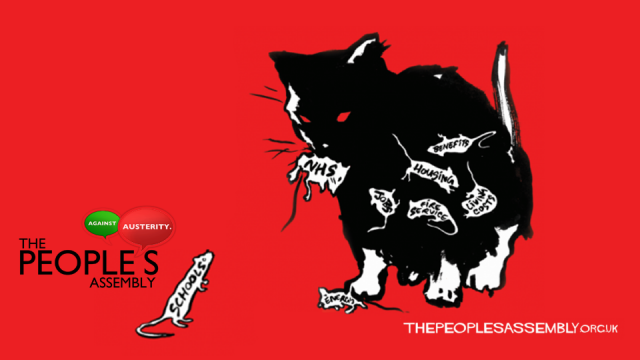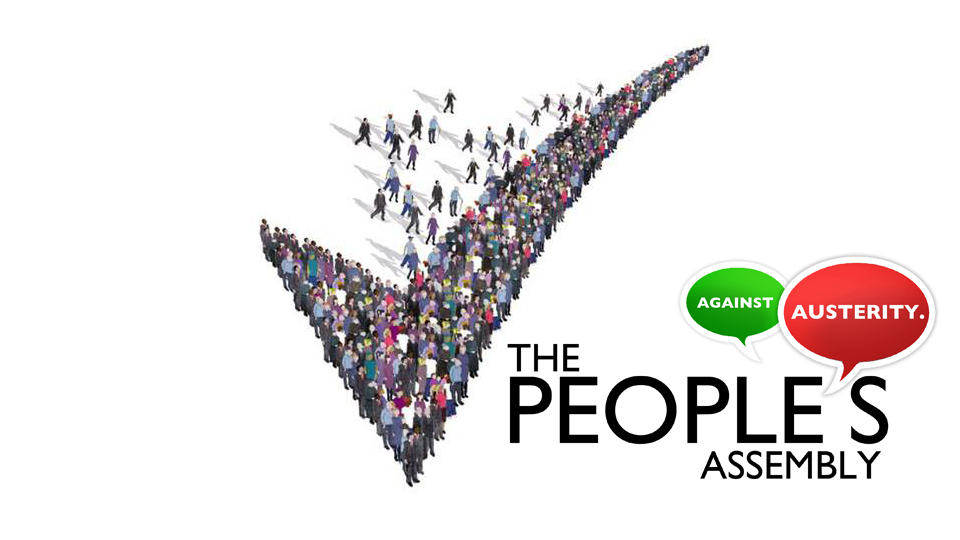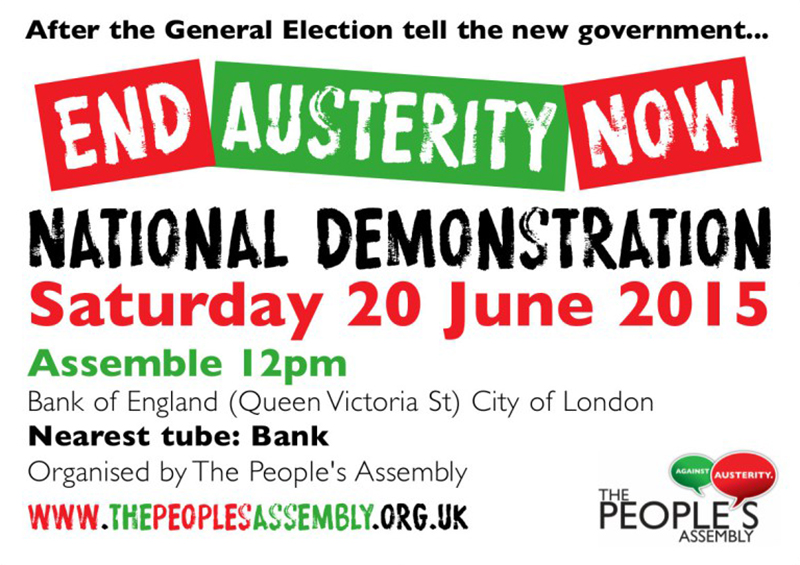
A justice minister who wants to bring back hanging. A health minister who doesn't believe in abortion. An equalities minister who voted against same-sex marriage. A disabilities minister who voted against benefits for disabled children. An employment minister who has repeatedly voted against job creation schemes. And an environment minister who voted to sell off England's public forest estate and backed the badger cull. Welcome to Britain's new Conservative government.
Under the last Coalition government, the Tories already implemented policies that threatened the poorest and most vulnerable. But they had the tempering influence of the Liberal Democrats to curb their worst excesses. Now, with free reign to push their policies undiluted, the Tories promise to become a more terrifying beast. The Queen's speech on May 27, the day parliament was sworn in, confirmed which measures will become part of their proposed legislative program.
Dismantling Public Services
Plans to create a seven-day National Health Service have been widely slammed by health professionals, who insist it will not be cost-effective and will further challenge an already overstretched staff-force. It was not mentioned in the Queen's speech, but the stealth privatization of the NHS looks set to continue.
Outsourcing of healthcare services has increased 500% since the Coalition government took over from Labour in 2010. Despite disastrous examples of botched care and providers breaking away from contracts early, the Conservatives continued to award contracts. They have also floated worrying plans to make patients pay for general practitioner visits and hospital stays, as well as outsourcing further services.
Failing schools will also face the threat of privatization under Conservative proposals to turn them into privately-run academies. Academy schools are not regulated in the way local authority schools are, meaning they have the freedom to set their own curriculum, hours and staff pay conditions. This means that religious groups and private organizations can legally push their own agendas at the expense of students gaining a solid education.
A proposed further £12 billion of cuts to the welfare budget may see a welfare state already shockingly eroded under the coalition change beyond recognition. If the bill is passed, household benefits will be capped at £23k (£3k less than the current rate), working-age benefits will be frozen for two years, and housing benefit will be denied to 18-to-21-year-olds. There have been hints that taxing disability benefits and altogether scrapping other benefits may also be part of the plans.
In a further blow to those in search of affordable accommodation, and despite Britain's already deepening housing crisis, the Tories also seek to extend the “Right to Buy” scheme to social housing tenants, which will let people buy their council houses.
Meanwhile, Cameron has insisted he will try to renegotiate the terms of Britain's membership of the European Union. If the attempt is refused, he has announced plans to hold a referendum on Britain leaving the E.U. by the end of 2017, which he is confident will will result in a “yes” vote. The Tories are dubious about their relationship with the E.U. because they're keen to stop what they call “benefit tourism” – when child benefits are sent to other E.U. countries – and in order to avoid joining the Euro.
A Bill of Rights – but Not for Immigrants
The Conservative government also wants to bring a vote to replace the Human Rights Act with a “British Bill of Rights." But contrary to many people's expectations, ministers are only bound to produce a draft of this within the next 12 months. The move is designed to sever the U.K.'s ties with the European Court so that the U.K. alone can be responsible for implementing its own human rights laws. The HRA is a cornerstone of British law, giving all U.K. citizens important rights including life, liberty and security, a fair trial, respect for private life, and freedom of expression.
Cameron's government, however, argues that the HRA has granted too many rights to prisoners, allowed extremists to remain in the country, caused immigration to spiral out of control, and generally robbed British courts of the ability to enforce what Cameron ominously refers to as “British values.”
Announcing the new immigration bill, the queen said it was designed to "ensure that this country attracts people who will contribute, and deter those who will not." If passed, it would charge legal short-term immigrants to use the NHS, ensure landlords are legally obliged to check tenants' immigration status, and give the government power to seize wages from illegally employed foreign workers. This approach seems to ignore the needs of those who arrive in the U.K. having fled from oppressive regimes.
While much of the document's wording suggests it is aimed mainly at Islamic extremists, there are fears that a new bill to counter extremism includes wording that will also hamper many people's right to protest. Behavior considered to present “a risk of public disorder, a risk of harassment, alarm or distress or creating a 'threat to the functioning of democracy'” will fall under its remit. A bill will also be put through parliament to prevent strikes going ahead unless 40% of balloted members vote for them, based on a turnout of at least 50% of workers entitled to vote. The Tory government also wants to allow agency staff to be employed in the place of striking staff.
Defiant in the face of their possible silencing, protesters late last month gathered outside the prime minister's home shortly after the queen spoke. Campaigning groups the People's Assembly Against Austerity, Class War and the National Campaign Against Fees and Cuts led the action. On May 30, a demonstration organized by anti-cuts protest group UK Uncut saw protesters meeting at London's Waterloo Bridge and traveling through central London to spread awareness of the unfair impact promised by the new government.
The People's Assembly has scheduled what promises to be a huge anti-austerity march in London on June 20. The group is "calling a major national demonstration to send a clear message to the Tory government; we demand an alternative to austerity and to policies that only benefit those at the top,” reads the People's Assembly website.
"We'll be assembling in the heart of the City of London right on the doorstep of the very people who created the crisis in the first place, and marching to the doorstep of Parliament. We demand that the bankers and elite should pay for the crisis and not the majority who had nothing to do with it... It will be an almighty show of strength. Don't let them trample on your democratic right to have your voice heard and to protest!”
Meanwhile, community-based efforts to help the U.K.'s most vulnerable are also expanding. It is estimated that the number of people using food banks will double to over 2 million a year under the £12 billion welfare cuts. Already, demand has become so high that many who come to food banks are turned away.
3 WAYS TO SHOW YOUR SUPPORT
- Log in to post comments














